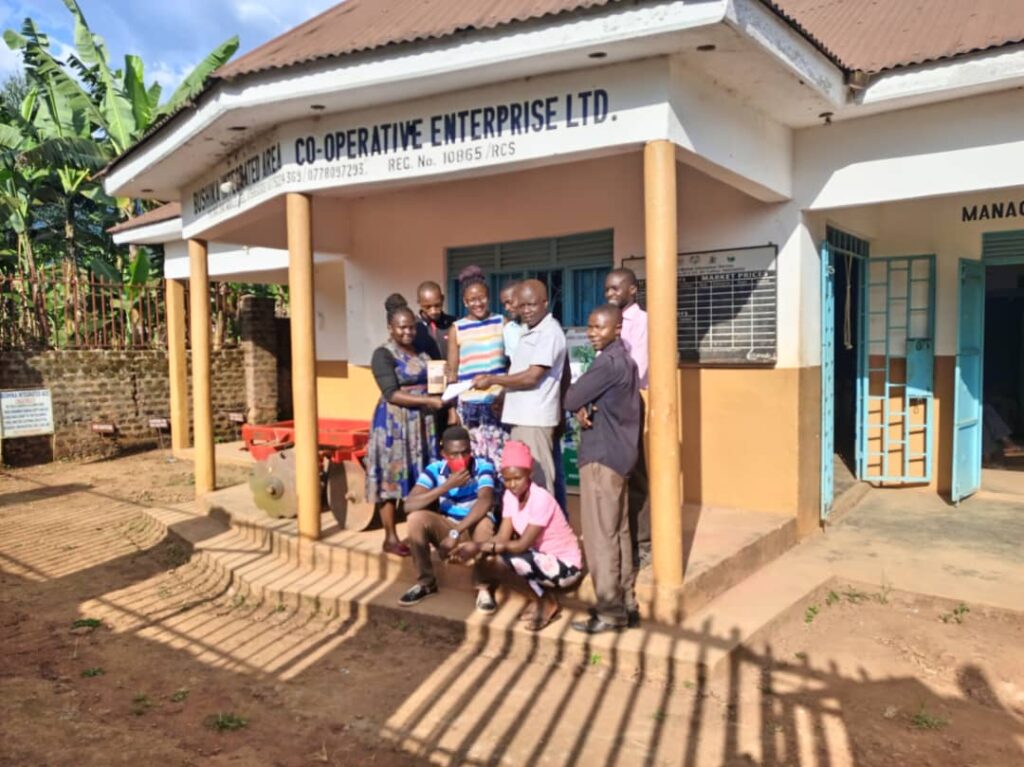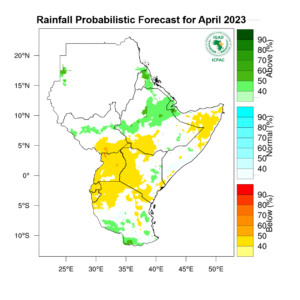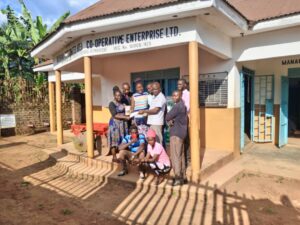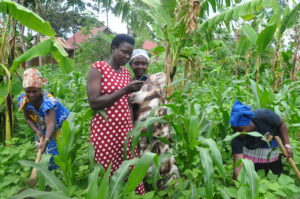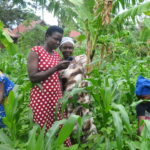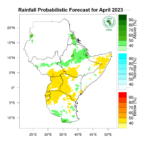Bushika Integrated Area Cooperative Enterprise (BIACE), is a member-owned cooperative established in 2010. Based in Bushika sub-county Bududa district, the cooperative had grown to over 3,040 members by 2024, with coffee and dairy as its primary income-generating activities. Despite their efforts, the cooperative felt that the local buyers offered non-competitive prices, leaving their members dissatisfied with the returns on their coffee. A preliminary survey of 359 farmers showed that coffee was the main cash crop (77%), but most farmers struggled to buy food and lacked access to critical inputs, largely due to high costs and limited access to credit. Less than 50% of the farmers had accessed formal credit, and many were forced to sell part of their harvest at low prices to middlemen due to the urgent need for cash. The cooperative urgently needed a better-paying buyer to help improve the income of its members.
M-Omulimisa aimed to address BIACE’s challenge by finding them access to a better-paying market, specifically an international buyer that could offer a premium price for their coffee. This process also required helping the cooperative meet international standards through certifications that would qualify them for these higher-value markets. M-Omulimisa implemented several strategic steps to help BIACE:
- Market Research & Buyer Identification: M-Omulimisa conducted thorough market research and identified a Germany-based buyer whose values and standards aligned closely with BIACE’s. Not only did they offer a premium price for high-quality coffee, but the buyer also demonstrated a deep understanding of the challenges faced by Ugandan smallholder farmers. They were willing to be patient and flexible, offering terms that reflected their commitment to supporting farmers. The buyer went out of their way to help BIACE thrive, working closely with the cooperative to ensure that they could meet the necessary requirements for exporting coffee, while providing flexible payment options to ease the financial pressure on the farmers. This willingness to accommodate the cooperative’s unique situation was instrumental in the success of the partnership.
- Logistical Support: Although BIACE had previously secured both Fairtrade and organic certification, as well as an export license from the Uganda Coffee Development Authority (UCDA), their export license had expired over a year ago without exporting a single kilogram of coffee. M-Omulimisa stepped in to provide logistical support, which included managing professional communication with the buyer, sending coffee samples for quality assessment, branding and rebagging, warehousing, and handling the necessary export paperwork. This ensured that BIACE met all the requirements to successfully export their coffee and secure the contract with the buyer.
- Facilitating Buyer Connections: To establish and strengthen the relationship between BIACE and the buyer, M-Omulimisa played a pivotal role by facilitating a series of virtual meetings between the cooperative leaders and the buyer. These meetings provided a platform for BIACE to showcase their coffee’s quality, certifications, and production capabilities while aligning with buyer’s stringent quality standards. Through these discussions, both parties were able to build trust, address concerns, and negotiate favourable terms. The culmination of these efforts was a contract for the sale of 19.2 tons of coffee at a premium price, representing a significant 30% increase over the prevailing national market rate offered by local buyers. This price difference was instrumental in improving the incomes of BIACE’s members, highlighting the value of accessing better international markets. By facilitating this communication and advocating for the cooperative, M-Omulimisa ensured that BIACE could not only enter the global market but also secure prices that far exceeded what they could achieve locally.
- Financial Support: Once the contract was secured, a new challenge surfaced: the cooperative lacked the liquidity to facilitate the transaction, particularly to make initial payments to their members. The available financing options were not only expensive but also entangled in lengthy approval processes, while the buyer required the coffee to be delivered within a short timeframe. To resolve this, M-Omulimisa successfully negotiated flexible terms with the buyer, allowing BIACE to deliver their coffee to a bonded warehouse and receive payments based on the quantity delivered. This arrangement helped the cooperative navigate its immediate financial constraints. On February 19th, 2024, BIACE delivered the first batch of 9,140 kgs of coffee to the warehouse in Kampala and received an initial payment of 80%, which allowed them to cover operational costs and make payments to their members as they prepared to deliver the remainder of the consignment.
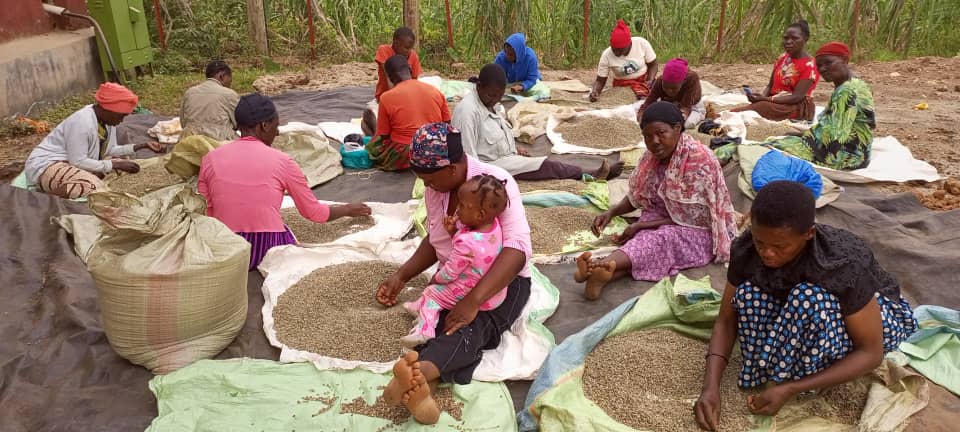
Result
By March 26th, 2024, BIACE had delivered 18,220 kilograms of coffee to the buyer, achieving 95% of the contracted volume. This marked a pivotal success for the cooperative, as they were able to access a better market and significantly increase the income for their members. Although there was a shortfall of 980 kilograms, this experience underscored the need for improved production planning, which they will focus on for future consignments. Now, with M-Omulimisa’s support, BIACE is on the verge of securing a second contract for another 19.2 tons of coffee, further proving the effectiveness of their partnership and the cooperative’s ability to access better markets and premium prices. This case study demonstrates how M-Omulimisa strategically assists cooperatives like BIACE in securing higher-value markets, resulting in sustainable income growth and improved livelihoods for smallholder farmers.
Testimony
Working with M-Omulimisa has been a game changer for our cooperative. They helped us not only secure better market access but also navigate the complex process of managing export logistics. Their support in connecting us with an international buyer, and negotiating favourable terms, has transformed how we do business. Our farmers are now earning more, and we’re looking forward to continued success with future contracts. – Samuel Wakinya, Chairperson of BIACE
Previously, we were losing a significant portion of our members’ coffee to other buyers because we lacked the financial capacity to purchase from them at competitive prices. Our margins were too slim to offer rates that matched the market, with our highest price for cherries capped at just 2,300 UGX. However, with access to the new market and the additional premiums from organic and Fairtrade certifications, we can now offer better prices and compete effectively. Our hard work is finally bearing fruit, thanks to the support of M-Omulimisa.” – Abner Wamboka, Manager of BIACE.

